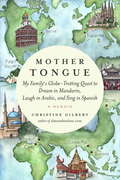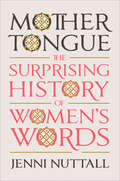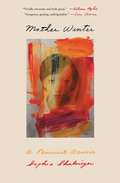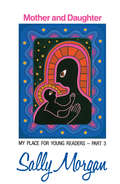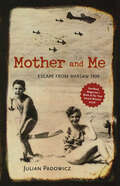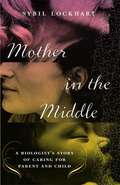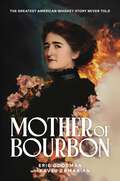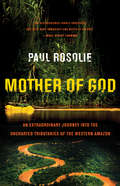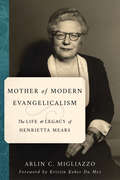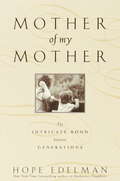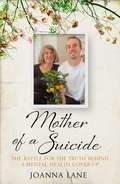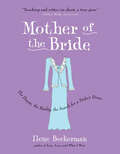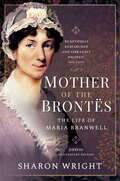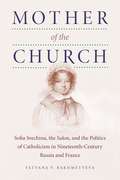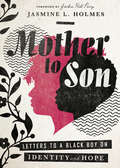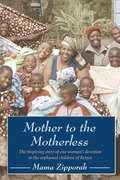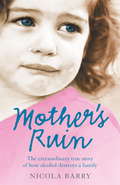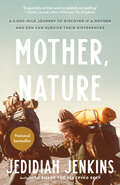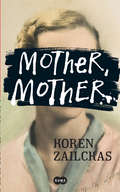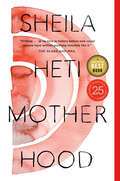- Table View
- List View
Mother Tongue: My Family's Globe-Trotting Quest to Dream in Mandarin, Laugh in Arabic, and Sing in Spanish
by Christine GilbertOne woman's quest to learn Mandarin in Beijing, Arabic in Beirut, and Spanish in Mexico, with her young family along for the ride. Imagine negotiating for a replacement carburetor in rural Mexico with words you're secretly pulling from a pocket dictionary. Imagine your two-year-old asking for more niunai at dinner--a Mandarin word for milk that even you don't know yet. Imagine finding out that you're unexpectedly pregnant while living in war-torn Beirut. With vivid and evocative language, Christine Gilbert takes us along with her into foreign lands, showing us what it's like to make a life in an unfamiliar world--and in an unfamiliar tongue. Gilbert was a young mother when she boldly uprooted her family to move around the world, studying Mandarin in China, Arabic in Lebanon, and Spanish in Mexico, with her toddler son and all-American husband along for the ride.Their story takes us from Beijing to Beirut, from Cyprus to Chiang Mai--and also explores recent breakthroughs in bilingual brain mapping and the controversial debates happening in linguistics right now. Gilbert's adventures abroad prove just how much language influences culture (and vice versa), and lead her to results she never expected. Mother Tongue is a fascinating and uplifting story about taking big risks for bigger rewards and trying to find meaning and happiness through tireless pursuit--no matter what hurdles may arise. It's a treat for language enthusiasts and armchair travelers alike.From the Hardcover edition.
Mother Tongue: The Surprising History of Women's Words
by Jenni Nuttall&“A fascinating look at how we talk about women. . . . Dense with information and anecdotes, Mother Tongue touches on the hilarious and the devastating, with ample dashes of an ingredient so painfully absent from most discussions of sex and gender: humor.&” ―Lisa Selin Davis, The Washington Post &“[Nuttall] examines the origins of words used over many centuries to describe women&’s bodies, desires, pregnancies, work lives, sexual victimhood, and stages of life. . . . Her research is comprehensive enough that even longtime word enthusiasts will find plenty of new trivia.&” ―The New YorkerAn enlightening linguistic journey through a thousand years of feminist language—and what we can learn from the vivid vocabulary that English once had for women&’s bodies, experiences, and sexualitySo many of the words that we use to chronicle women&’s lives feel awkward or alien. Medical terms are scrupulously accurate but antiseptic. Slang and obscenities have shock value, yet they perpetuate taboos. Where are the plain, honest words for women&’s daily lives?Mother Tongue is a historical investigation of feminist language and thought, from the dawn of Old English to the present day. Dr. Jenni Nuttall guides readers through the evolution of words that we have used to describe female bodies, menstruation, women&’s sexuality, the consequences of male violence, childbirth, women&’s paid and unpaid work, and gender. Along the way, she challenges our modern language&’s ability to insightfully articulate women&’s shared experiences by examining the long-forgotten words once used in English for female sexual and reproductive organs. Nuttall also tells the story of words like womb and breast, whose meanings have changed over time, as well as how anatomical words such as hysteria and hysterical came to have such loaded legacies.Inspired by today&’s heated debates about words like womxn and menstruators—and by more personal conversations with her teenage daughter—Nuttall describes the profound transformations of the English language. In the process, she unearths some surprisingly progressive thinking that challenges our assumptions about the past—and, in some cases, puts our twenty-first-century society to shame. Mother Tongue is a rich, provocative book for anyone who loves language—and for feminists who want to look to the past in order to move forward.
Mother Warriors: A Nation of Parents Healing Autism Against All Odds
by Jenny MccarthyMother Warriors shares the heartfelt and deeply personal stories of families navigating through the many autism therapies to heal their children, as well as Jenny's own journey as an autism advocate and a mother.
Mother Winter: A Memoir
by Sophia Shalmiyev“Vividly awesome and truly great.” —Eileen Myles “I love this gorgeous, gutting, unforgettable book.”—Leni Zumas “A rich tapestry of autobiography and meditations on feminism, motherhood, art, and culture, this book is as intellectually satisfying as it is artistically profound. A sharply intelligent, lyrically provocative memoir.” —Kirkus Reviews (starred review) An arresting memoir equal parts refugee-coming-of-age story, feminist manifesto, and meditation on motherhood, displacement, gender politics, and art that follows award-winning writer Sophia Shalmiyev’s flight from the Soviet Union, where she was forced to abandon her estranged mother, and her subsequent quest to find her.Russian sentences begin backward, Sophia Shalmiyev tells us on the first page of her striking, lyrical memoir, Mother Winter. To understand the end of her story we must go back to her beginning. Born to a Russian mother and an Azerbaijani father, Shalmiyev was raised in the stark oppressiveness of 1980s Leningrad (now St. Petersburg). An imbalance of power and the prevalence of antisemitism in her homeland led her father to steal Shalmiyev away, emigrating to America, abandoning her estranged mother, Elena. At age eleven, Shalmiyev found herself on a plane headed west, motherless and terrified of the new world unfolding before her. Now a mother herself, in Mother Winter Shalmiyev depicts in urgent vignettes her emotional journeys as an immigrant, an artist, and a woman raised without her mother. She tells of her early days in St. Petersburg, a land unkind to women, wayward or otherwise; her tumultuous pit-stop in Italy as a refugee on her way to America; the life she built for herself in the Pacific Northwest, raising two children of her own; and ultimately, her cathartic voyage back to Russia as an adult, where she searched endlessly for the alcoholic mother she never knew. Braided into her physical journey is a metaphorical exploration of the many surrogate mothers Shalmiyev sought out in place of her own—whether in books, art, lovers, or other lost souls banded together by their misfortunes. Mother Winter is the story of Shalmiyev’s years of travel, searching, and forging meaningful connection with the worlds she occupies—the result is a searing observation of the human heart and psyche’s many shades across time and culture. As critically acclaimed author Michelle Tea says, “with sparse, poetic language Shalmiyev builds a personal history that is fractured and raw; a brilliant, lovely ache.”
Mother and Daughter: The Story of Daisy and Gladys Corunna
by Sally MorganSally Morgan’s My Place is an Australian classic. Since first publication in 1987, My Place has sold more than half a million copies in Australia, been translated and read all over the world, and been reprinted dozens of times. Sally’s rich, zesty and moving work is perhaps the best-loved biography of Aboriginal Australia ever written. My Place for Young Readers is an abridged edition, especially adapted for younger readers, that retains all the charm and power of the original. Mother and Daughter follows the lives of Daisy and Gladys Corunna, Sally’s grandmother and mother.
Mother and Me: Escape from Warsaw 1939
by Julian Padowicz"In 1939," Julian Padowicz says, "I was a Polish Jew-hater. Under different circumstances my story might have been one of denouncing Jews to the Gestapo. As it happened, I was a Jew myself, and I was seven years old." Julian's mother was a Warsaw socialite who had no interest in child-rearing. She turned her son over completely to his governess, a good Catholic, named Kiki, whom he loved with all his heart. Kiki was deeply worried about Julian's immortal soul, explaining that he could go to Heaven only if he became a Catholic. When bombs began to fall on Warsaw, Julian's world crumbled. His beloved Kiki returned to her family in Lodz; Julian's stepfather joined the Polish army, and the grief-stricken boy was left with the mother whom he hardly knew. Resourceful and determinded, his mother did whatever was necessary to provide for herself and her son: she brazenly cut into food lines and befriended Russian officers to get extra rations of food and fuel. But brought up by Kiki to distrust all things Jewish, Julian considered his mother's behavior un-Christian. In the winter of 1940, as conditions worsened, Julian and his mother made a dramatic escape to Hungary on foot through the Carpathian mountains and Julian came to believe that even Jews could go to Heaven.
Mother in the Middle
by Sybil LockhartSybil Lockhart, a Berkeley neurobiologist, became a "mother in the middle" when she was pregnant with her second daughter and her mother was diagnosed with Alzheimer's disease. What makes Sybil's story different, and so powerful, is that she understood the neurological processes, by turns exciting and devastating, that were taking place in the brains of those she loved. Interweaving her scientific expertise with her own complicated emotions, she writes with elegant simplicity and breathtaking honesty about biology's inevitable, powerful effects on the people around her. When her mother begins to show the first subtle signs of the disease that is slowly ravaging her brain, Sybil refuses to consider the possibility of dementia, insisting that all her mother needs is a daughter nearby. She relocates her young family to her beloved San Francisco Bay Area, where her memories of her mother and her childhood are deeply anchored. As Sybil sets about creating new memories against the backdrop of her pst, the emerging undeniable truth about her mother's condition threatens to overwhelm her ability to maintain her career, nurture her marriage, raise her young daughter, and care for herself during her second pregnancy. Even though she appreciates the beauty of the dramatic biological processes at work inside the brains of her family members, she also understands their inevitable power, and she bravely describes the complicated emotions -- denial, rage, ambivalence, exhaustion -- that so many caregivers experience. With a unique combination of science and intimate experience, Mother in the Middle is a story of mothers and daughters, science and creativity, and life's exquisite intertwining of love and loss.
Mother of Bourbon: The Greatest American Whiskey Story Never Told
by Eric GoodmanThe outrageously inspiring story of the most successful and influential woman distiller of Kentucky Bourbon that nobody&’s heard…until now! Introducing Mary Dowling, Mother of Bourbon.&“Unsung bourbon distiller—and force of nature—Mary Dowling overcame family tragedy, discrimination, and Prohibition, to achieve extraordinary success. Her story comes to life in this page-turning novel.&” —Susan Reigler, author of Kentucky Bourbon: The Essential Guide to the American Spirit Born in 1859 to Irish immigrants who&’d escaped the great potato famine, Mary Dowling arrived at the height of anti-Irish and anti-Catholic fervor in America. The hardscrabble life her family led provided the foundation of grit and determination that would serve her well, along with a natural gift for numbers and planning. She married the enterprising John Dowling when she was just fifteen and he was thirty-three. Despite their age gap, John was a kind and adoring husband who recognized Mary&’s remarkable skills and made her his partner not just in life but in business. He offered her oversight of their burgeoning bourbon company&’s financial books and sought her insight and advice on acquisition and expansion as they steadily grew from distillery investors to sole proprietors of Waterfill and Frazier in Tyrone, Kentucky, just outside Lawrenceburg, in the heart of Bourbon Country. &“Mother of Dragons? Give me the Mother of Bourbon! In this historical fiction, Kaveh Zamanian and Eric Goodman break the boundaries of traditional bourbon books, just like the woman it&’s based on—Mary Dowling. From love to business, this bourbon soap opera is a must read, will keep you entertained, and make you question everything you thought you knew about America&’s Spirit.&” —Fred Minnick, author of Bourbon: the Rise, Fall and Rebirth of an American Whiskey, Bourbon Curious, and Whiskey Women: The Untold Story of How Women Saved Bourbon, Scotch and Irish Whiskey Mary&’s first trials arrive at the turn of the century in a series of tragedies that leave her widowed and with a business no one wants to support. Steering not only the lives of her eight children, she bucks up against a male-dominated bank and distributor that drop her because women don&’t run businesses, to align herself with progressive partners who value the dollar over outdated ideas about gender. She scales to ever higher heights, becoming an influential member of Lawrenceburg society while achieving immense wealth at a time when women still couldn&’t vote. When Prohibition arrives with its attendant animosity toward immigrants and Catholics, Mary is forced into semi-retirement—until the federal government comes after her on trumped-up charges of bootlegging. Only then does she bite back, determining that if she is going to be treated like a criminal, she will behave like one—taking her operation to Juarez, Mexico, to begin another iteration of Waterfill and Frazier that would distill and legally distribute bourbon throughout Mexico and, less legally, north into the US. Mother of Bourbon: The Greatest American Whiskey Story Never Told is the never-before-told story of a pioneering and visionary woman who achieved success in a system designed to suppress her, and against a government that strived to repress her. Mary&’s courage and determination are the hallmarks that live on today in Mary Dowling Whiskey, as extraordinary and distinctive as the woman whose name it bears.
Mother of God
by Paul RosolieIn the Madre de Dios ("Mother of God") region of Peru, where the Amazon River begins, the cloud forests of the Andes converge with the lowland Amazon rainforest to create the most biodiverse place on the planet. In January 2006, Paul Rosolie, a restless eighteen-year-old hungry for adventure, embarked on a journey to the western Amazon that would transform his life.Venturing alone into the most inaccessible reaches of the jungle, he encountered massive snakes, isolated tribes, prowling jaguars, giant anteaters, poachers trafficking in the black market of endangered species, and much more. He even discovered a new kind of ecosystem now known as a "floating forest." Yet today the primordial depths of the Madre de Dios are in grave danger.In Mother of God, this explorer and conservationist relives his amazing odyssey to the heart of the wildest place on earth. As he delved deeper into his search for the secret Eden, spending extended periods in isolation, he found things he never imagined could exist. But as the legendary explorer Percy Fawcett warned, "The few remaining unknown places of the world exact a price for their secrets."
Mother of Modern Evangelicalism: The Life and Legacy of Henrietta Mears (Library of Religious Biography (LRB))
by Arlin C. MigliazzoAlthough she was never as prominent as Billy Graham or many of the other iconic male evangelists of the twentieth century, Henrietta Mears was arguably the single most influential woman in the shaping of modern evangelicalism. Her seminal work What the Bible Is All About sold millions of copies, and key figures in the early modern evangelical movement like Bill Bright, Harold John Ockenga, and Jim Rayburn frequently cited her teachings as a formative part of their ministry. Graham himself stated that Mears was the most important female influence in his life other than his mother or wife. Mother of Modern Evangelicalism is the first comprehensive biography of Henrietta Mears. Arlin Migliazzo uses previously overlooked archival sources and dozens of interviews with Mears associates to assemble a detailed portrait of her life and legacy, including the way she helped steer conservative theology between fundamentalism and liberal modernism with her relentless focus on the Christian life as an act of consecrated service. Readers will find here a religious leader worthy of emulation in today&’s world—one who sought an alternative to the divisive polemics of her own day, staying fiercely committed to the faith while fighting against the anti-intellectualism and cultural parochialism that had characterized the fundamentalist movement of the early twentieth century. While she never technically delivered a Sunday morning message from the pulpit and refused to be called a preacher, Henrietta Mears&’s life stands here as a sermon about graceful leadership and faithful engagement with the world.
Mother of My Mother: The Intricate Bond Between Generations
by Hope EdelmanIn her bestselling Motherless Daughters, Hope Edelman articulated the effects of early mother loss with stunning courage and honesty. In doing so, she helped hundreds of thousands of women heal. Now, in her new book--part memoir, part reportage--she brilliantly explores the three-generational triangle from which women develop their female identities: the grandmother-mother-granddaughter relationship. Edelman writes that her grandmother and her mother together "defined the terms 'mother,' 'daughter,' and 'woman' for me. The three of us, in my memory, are separate yet linked, like sequential pearls on a strand." Drawing from her own experience and the recollections of more than seventy other granddaughters, Edelman constructs an eloquent, insightful narrative filled with stories of women who were each other's nurturers, confidantes, nemeses, and day-to-day supporters, among other roles. At the center of all these stories stands the maternal grandmother. In the pages of Mother of My Mother, readers will meet the "Gentle Giant," the matriarch who exercises behind-the-scenes power in her family; the "Autocrat," who rules her extended clan like a despot; and the "Kinkeeper," the grandmother who acts as the family's social, cultural, or religious center. Then, of course, there is Edelman's own maternal grandmother, the "Benevolent Manipulator," whose love for her family is rivaled only by her desire for control. Edelman's complicated, challenging, and dynamic relationship with her "colorful, opinionated, ubiquitous, stubborn, loving, patient ..." grandmother is the consistent thread that runs throughout the book.
Mother of a Suicide: Fighting for the Truth
by Joanna LaneIt's bad enough to lose a child to suicide, but what do you do if you discover that the depression was caused by an underlying medical condition, and that a million others are at risk because vital medical information is being suppressed? Joanna Lane tells the story of her 31-year-old son's death, her grief and her search for the reason behind his suicide. When she finds that a rarely diagnosed but far from rare condition probably lay behind his despair she tries to raise the alarm to save others. However, her unsuspecting attempts are met with obstruction after obstruction. Gradually she confronts the truth that the organisations set up to protect the public are not doing their job, and we are all at risk. A must-read for anyone who has ever had a head injury, or been diagnosed with ME, Chronic Fatigue Syndrome or Fibromyalgia. And a must-read for anybody who still believes that important health decisions are made with the patient's welfare in mind. In this heartfelt, heartrending, angry and yet uplifting book, Joanna Lane charts her journey through grief and on to a fight that saw her set against the entrenched world of the medical establishment. A world that still in large part turns away from the truth which she uncovered.
Mother of an Army
by Charles LudwigThis book is about Catherine Booth, one of the most remarkable women who ever lived. The crowd that marched by refused to be hurried. Its mood was expressed by a tottering old woman who insisted on taking her time. "No, no! Let others move on," she whispered to the crisply dressed officer as she studied the pale face in the casket before her. "I've a right to stop. I've come sixty miles to see her again. She was the means of saving my two sons." Altogether, fifty thousand streamed by to pay their last respect. And additional thousands attended the funeral. Her death was an occasion the city of London did not wish to forget. Catherine Booth, mother of The Salvation Army, had at last finished her course. Few women of any generation have been as much used by the Lord as Kate--the affectionate name her husband employed. Though tormented by painful disease from childhood, she had learned the secret of making her sickbed a Mount Pisgah and then claiming, and possessing, the land below.
Mother of the Bride: The Dream, the Reality, the Search for a Perfect Dress
by Ilene Beckerman“An account that is sweetly sentimental and brutally honest, touching and witty—in short, a true gem.” —Publishers Weekly, starred review “A work that adds great luster to an already golden event.” — The Memphis Commercial Appeal “Her prose is spare, but rich with meaning and always very honest.” — The Cleveland Plain Dealer “Pithy wit and cute drawings sketch the happy tears, bittersweet memories and flares of anxiety that a daughter’s wedding elicits.” — The Dallas Morning News The relationship between a mother and daughter is often fraught— but never so much as during the preparations for that walk down the aisle. Ilene Beckerman has taken that walk with three daughters and tells us—with great wisdom and wit—why childbirth is less painful than planning a wedding.
Mother of the Brontës: When Maria Met Patrick - 200th Anniversary Edition
by Sharon WrightThe groundbreaking biography of Maria Branwell reveals a remarkable woman who has been lost in the shadows of her gifted children, Charlotte, Emily and Anne Brontë. The witty, clever and intrepid Cornish lady of letters, lover of Patrick and mother of genius has been missing for too long. The extraordinary Brontës were a family like no other and it all began when Maria met Patrick.
Mother of the Church: Sofia Svechina, the Salon, and the Politics of Catholicism in Nineteenth-Century Russia and France (NIU Series in Slavic, East European, and Eurasian Studies)
by Tatyana BakhmetyevaSofia Petrovna Svechina (1782–1857), better known as Madame Sophie Swetchine, was the hostess of a famous nineteenth-century Parisian salon. A Russian émigré, Svechina moved to France with her husband in 1816. She had recently converted to Roman Catholicism, and the salon she opened acquired a distinctly religious character. It quickly became one of the most popular salons in Paris and was a meeting place for the French intellectual Catholic elite and members of the Liberal Catholic movement. As a salonniére, Svechina developed close friendships with some of the most noted public figures in the Liberal Catholic movement. Her involvement with her guests went deeper than the typical salonniére's. She was a mentor, spiritual counselor, and intellectual advisor to many distinguished Parisian men and women, and her influence extended beyond the walls of her salon into the public world of politics and ideas. In this fascinating biography, Tatyana Bakhmetyeva seeks to understand the creative process that informed Svechina's life and examines her subject in the context of nineteenth-century thought and letters. It will appeal to educated readers interested in European and Russian history, the history of Catholicism, and women's history.
Mother to Son: Letters to a Black Boy on Identity and Hope
by Jasmine L. Holmes"Wynn is my son. No little boy could be more loved by his parents. Inquisitive, fiercely affectionate, staunchly opinionated, he sees the world through eyes of wonder and has yet to become jaded by society's cruelty. I know he'll grow up with stories of having been made to feel 'other' because of the color of his skin. I want to teach him that, though life's unfair, he still has incomparable value in the eyes of his heavenly Father. I know this wondrous little person has the potential to change the world—and I want him to know it too."Mother to Son
Mother to Tigers
by George Ella Lyon Peter CatalanottoMother to Tigers This remarkable book--strikingly striped as tigers are, sympathetically spoken as any child could wish--is a moving picture-book biography of Helen Martini, founder of the Bronx Zoo's animal nursery. Full color.
Mother to the Motherless
by Mama ZipporahFollowing the life and doings of Mama Zipporah, a modern day saint, Mother to the Motherless is the memoir of an incredible woman's inspiring true story of rising from the depths of abuse and poverty to found one of the most successful children's shelters in Kenya. The beginnings of Mama Zipporah's life were filled with violence and hardship, as the challenges of an abusive father and an uncaring society left Mama and her mother virtually without options. Without the support of the local church in those early days, Mama's life could have continued down this dark path; as it was, she and her mother had barely enough to get by. Mama grew to despise poverty and everything that it represented: the selfishness and greed of the wealthy, and the shocking effects it had on the poor. Devoting her life to eradicating poverty while refusing to accept it as simply a fact of life, Mama would come to establish the Huruma Children's Home in Kenya, a children's shelter that continues to perform the same function as the church did in Mama's youth: protecting the helpless children and teaching them to make the world a better place.
Mother's Ruin
by Nicola BarryNicola Barry grew up in well-to-do Murrayfield, Edinburgh. Her father was a hopsital consultant, her mother was medically trained, her brothers boarders at public school. But behind the closed doors of their imposing family home, her mother was drinking herself to death. A beautiful, quirky woman, this is the story of how Monica Barry became a prisoner to alcohol and a prisoner in her own home, her addiction slowly sucking the life out of her. And how - with her father at work, and her brothers away at school - Nicola spent a lot of her childhood as her mother's unofficial carer: hauling her from the bath when she was too drunk to function and running errands to buy her booze. Full of harrowing incidents, and warmed by a touching, bleak humour, this is the powerful story of how a mother drank herself to death and how alcohol destroyed a family. And of how Nicola battled with her own alcoholism but, determined to throw off her mother's legacy, came through - a survivor.
Mother's Ruin
by Nicola BarryNicola Barry grew up in well-to-do Murrayfield, Edinburgh. Her father was a hopsital consultant, her mother was medically trained, her brothers boarders at public school. But behind the closed doors of their imposing family home, her mother was drinking herself to death. A beautiful, quirky woman, this is the story of how Monica Barry became a prisoner to alcohol and a prisoner in her own home, her addiction slowly sucking the life out of her. And how - with her father at work, and her brothers away at school - Nicola spent a lot of her childhood as her mother's unofficial carer: hauling her from the bath when she was too drunk to function and running errands to buy her booze. Full of harrowing incidents, and warmed by a touching, bleak humour, this is the powerful story of how a mother drank herself to death and how alcohol destroyed a family. And of how Nicola battled with her own alcoholism but, determined to throw off her mother's legacy, came through - a survivor.
Mother, Nature: A 5,000-Mile Journey to Discover if a Mother and Son Can Survive Their Differences
by Jedidiah JenkinsFrom New York Times bestselling author of To Shake the Sleeping Self. &“Exquisitely written and completely compelling . . . As Jedidiah Jenkins traces a 5,000-mile route with his wildly entertaining mother, Barb, he begins to untangle the live wires of a parent-child bond and to wrestle with a love that hurts.&”—Suleika Jaouad, author of Between Two Kingdoms When his mother, Barbara, turns seventy, Jedidiah Jenkins is reminded of a sobering truth: Our parents won&’t live forever. For years, he and Barbara have talked about taking a trip together, just the two of them. They disagree about politics, about God, about the project of society—disagreements that hurt. But they love thrift stores, they love eating at diners, they love true crime, and they love each other. Jedidiah wants to step into Barbara&’s world and get to know her in a way that occasional visits haven&’t allowed. They land on an idea: to retrace the thousands of miles Barbara trekked with Jedidiah&’s father, travel writer Peter Jenkins, as part of the Walk Across America book trilogy that became a sensation in the 1970s. Beginning in New Orleans, they set off for the Oregon coast, listening to podcasts about outlaws and cult leaders—the only media they can agree on—while reliving the journey that changed Barbara&’s life. Jedidiah discovers who Barbara was as a thirty-year-old writer walking across America and who she is now, as a parent who loves her son yet holds on to a version of faith that sees his sexuality as a sin. Along the way, he peels back the layers of questions millions are asking today: How do we stay in relationship when it hurts? When do boundaries turn into separation? When do we stand up for ourselves, and when do we let it go? Tender, smart, and profound, Mother, Nature is a story of a remarkable mother-son bond and a moving meditation on the complexities of love.
Mother, mother: The Sisters, Mother, Mother And Dark Rooms
by Koren ZailckasFrom Koren Zailckas, author of the iconic memoir SMASHED: an electrifying debut novel about a family being torn apart by the woman who claims to love them most Josephine Hurst has her family under control. With two beautiful daughters, a brilliantly intelligent son, a tech-guru of a husband, and a historical landmark home, her life is picture perfect. But living in this matriarch's determinedly cheerful, yet subtly controlling domain hasn't been easy for her family, and when her oldest daughter, Rose, runs off with a mysterious boyfriend, Josephine tightens her grip, gradually turning her flawless home into a darker sort of prison. Resentful of her sister's newfound freedom, Violet turns to eastern philosophy, hallucinogenic drugs, and extreme fasting, eventually landing herself in a psych ward. Meanwhile, her brother, Will, recently diagnosed with Asperger's, shrinks further into a world of self-doubt. Their father, Douglas, finds resolve in the bottom of a bottle--an addict craving his own chance to escape. Josephine struggles to maintain the family's impeccable faCade, but when a violent incident leads to a visit from child protective services, the truth about the Hursts might finally be revealed. Now with Extra Libris material, including a reader's guide and bonus content
Motherhood
by Sheila HetiA daring, funny, and poignant novel about the desire and duty to procreate, by one of our most brilliant and original writersMotherhood treats one of the most consequential decisions of early adulthood--whether or not to have children--with the intelligence, wit and originality that have won Sheila Heti international acclaim, and which led her previous work, How Should a Person Be?, to be called "one of the most talked-about books of the year" (TIME magazine). Having reached an age when most of her peers are asking themselves when they will become mothers, Heti's narrator considers, with the same urgency, whether she will do so at all. Over the course of several years, under the influence of her partner, body, family, friends, mysticism and chance, she struggles to make a moral and meaningful choice. In a compellingly direct mode that straddles the forms of the novel and the essay, Motherhood raises radical and essential questions about womanhood, parenthood, and how--and for whom--to live.
Motherhood Exaggerated
by Alan M. Dershowitz Judith Hannan Leonard WexlerIn the past, the few memoirs about children battling cancer dealt mostly with death and grief. This passionate retelling by a survivor's mother is about the struggle to help shepherd her child out of illness, towards health and through survival. Now that more children survive cancer, this passionate retelling by the survivor's mother is required reading; the struggle of helping move the child out of illness.
